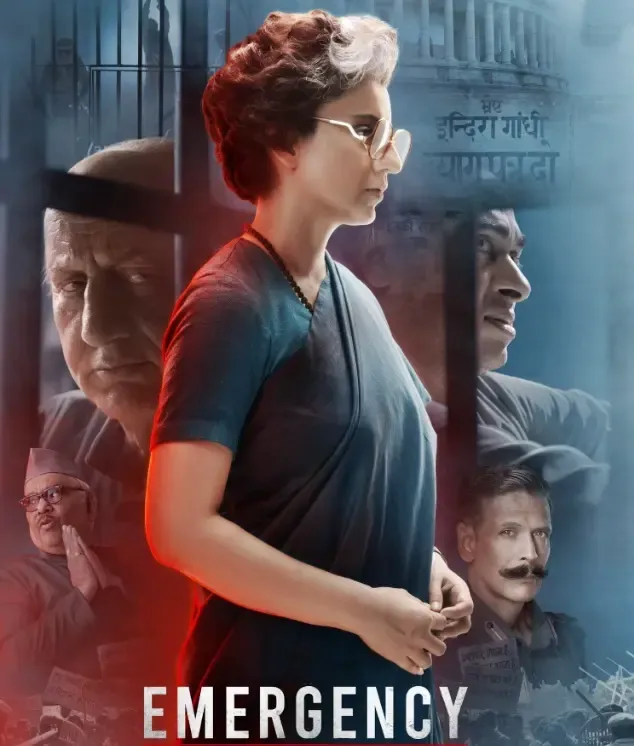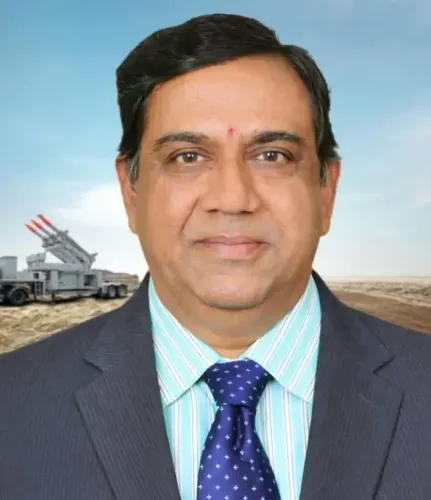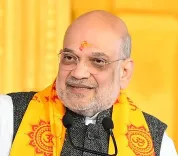Kangana's Stellar Performance in 'Emergency': A Powerful Fusion of Politics, Emotion, and History

Synopsis
Key Takeaways
- Engaging portrayal of Indira Gandhi by Kangana Ranaut.
- Ambitious narrative focusing on a pivotal chapter in Indian history.
- Strong supporting cast adds depth to the film.
- Impressive cinematography captures the essence of the 1970s.
- Thought-provoking themes reflect on democracy and power.
Directed by: Kangana Ranaut, Cast: Kangana Ranaut, Anupam Kher, Shreyas Talpade, Vishak Nair, Mahima Chaudhry, Milind Soman and Satish Kaushik, Duration: 2h 28m, Rating: 4.5 stars.
Kangana Ranaut’s Emergency is a grand, ambitious biographical film that addresses one of the most significant and controversial chapters in Indian political history—the Emergency period from 1975 to 1977. This film aims not only to highlight the authoritarian governance of then Prime Minister Indira Gandhi but also examines the nuances of Indian democracy, political rivalries, and the personal stories of key figures during this era. With a stellar ensemble cast and sharp direction by Kangana, Emergency is both a gripping political narrative and a visually stunning depiction of an epoch that transformed contemporary India.
At its essence, Emergency is a character-focused investigation of Indira Gandhi’s controversial rule and the declaration of the Emergency. During this tumultuous period, civil rights were suppressed, democracy was halted, and the government exercised unchecked authority. Kangana Ranaut takes on the role of the formidable Indira Gandhi, delivering a powerful and nuanced performance that encapsulates the complexity of this historical persona.
The film’s storyline encompasses critical events from Gandhi’s administration, including the Bangladesh Liberation War, Operation Blue Star, the emergence of Khalistani separatism, and the dramatic assassination of Indira Gandhi in 1984. Nonetheless, the 21-month Emergency period serves as the emotional and political foundation of the narrative. Kangana skillfully intertwines intense political drama with personal conflicts—particularly the strained relationship between Indira and her son Sanjay Gandhi (Vishak Nair), whose controversial actions, such as forced sterilization campaigns, are prominently highlighted.
What stands out is the film's avoidance of propaganda. Despite its depiction of a divisive leader, Emergency refrains from oversimplifying or glorifying the intricate figures of Indian politics during that period. Instead, it offers a multifaceted perspective on power, idealism, and the harsh repercussions of unrestrained governance. Through its compelling screenplay, Emergency presents a candid yet balanced portrayal of history—neither entirely condemning nor absolving Indira Gandhi.
Kangana Ranaut’s interpretation of Indira Gandhi is among the film's strongest attributes. She adeptly embodies the unyielding, formidable nature of one of India’s most prominent Prime Ministers, while also revealing the personal sacrifices entailed in her decisions. The performance is rich, with Kangana successfully portraying both the steely resolve and the emotional vulnerability that characterized Gandhi’s leadership during a chaotic era.
As a director, Kangana adopts a bold and assured approach. She infuses a unique, personal touch to the material, harmonizing historical occurrences with human drama. Her skillful navigation of the narrative without conveying a biased viewpoint is praiseworthy, as she constructs scenes imbued with tension and seriousness that draw viewers into the political turmoil of the time. Kangana’s direction demonstrates that she is not only a remarkable actress but also a visionary filmmaker capable of managing sensitive, intricate subjects with grace.
The ensemble cast in Emergency is remarkable, with each actor delivering unforgettable performances. Vishak Nair as Sanjay Gandhi is particularly noteworthy. His portrayal is both engaging and relatable, capturing the youthful hubris and idealism of a figure who was simultaneously adored and despised. Nair breathes energy and depth into the character, making Sanjay’s controversial involvement in the Emergency feel tragically poignant.
Anupam Kher as Jayaprakash Narayan, the primary opposition leader, brings his characteristic depth to the role. He embodies the role of a relentless champion for democracy, providing the film with moral clarity amidst the political chaos. Likewise, the late Satish Kaushik as Jagjivan Ram and Milind Soman as Field Marshal Sam Manekshaw deliver nuanced portrayals that enrich the film’s depiction of political and military leadership. Shreyas Talpade, in his role as Prime Minister Atal Bihari Vajpayee, leaves a lasting impression with his subtle performance, portraying the statesman’s dignified yet warm-hearted nature.
Mahima Chaudhry as Pupul Jayakar, Indira Gandhi’s close associate, brings emotional equilibrium to the film, portraying a strong yet compassionate character who navigates the delicate dynamics with the Prime Minister.
Visually, Emergency is a triumph. The cinematography exquisitely captures the essence of 1970s India, from the bustling streets of Delhi to the tense political arenas. The film’s attention to period detail is meticulously rendered, effectively bringing the era to life with a realism that is both immersive and enlightening. The lighting choices, particularly during high-stakes political confrontations, add a layer of visual tension that heightens the narrative stakes.
Musically, the film excels in utilizing its soundtrack to reflect the political and emotional gravity of the story. Songs like Singhasan Khali Karo and Sarkar Ko Salaam Hai serve not only as dramatic musical interludes but also as thematic undercurrents that resonate with the socio-political commentary. The background score amplifies the intensity of pivotal moments, helping to underscore the tumultuous nature of the period.
Emergency is an ambitious and thought-provoking film that deeply explores a crucial chapter in Indian history. Kangana Ranaut excels as both the director and the leading actress, offering a layered representation of Indira Gandhi that is both enthralling and complex. The supporting cast delivers stellar performances, with Vishak Nair's Sanjay Gandhi being particularly noteworthy.
In the midst of action-laden films dominating the cinematic landscape, Emergency emerges as a refreshing and meaningful experience, suitable for family viewing. The film offers an in-depth exploration of a pivotal moment in India's past, illustrating how history ought to be recounted—truthfully, with dignity, and through captivating storytelling. With powerful performances and meticulous attention to detail, the film not only entertains but also enlightens. Hats off to the entire team for bringing this essential narrative to the screen. Emergency is a must-see for anyone who values films that transcend mere entertainment, offering a reflective examination of our history.










